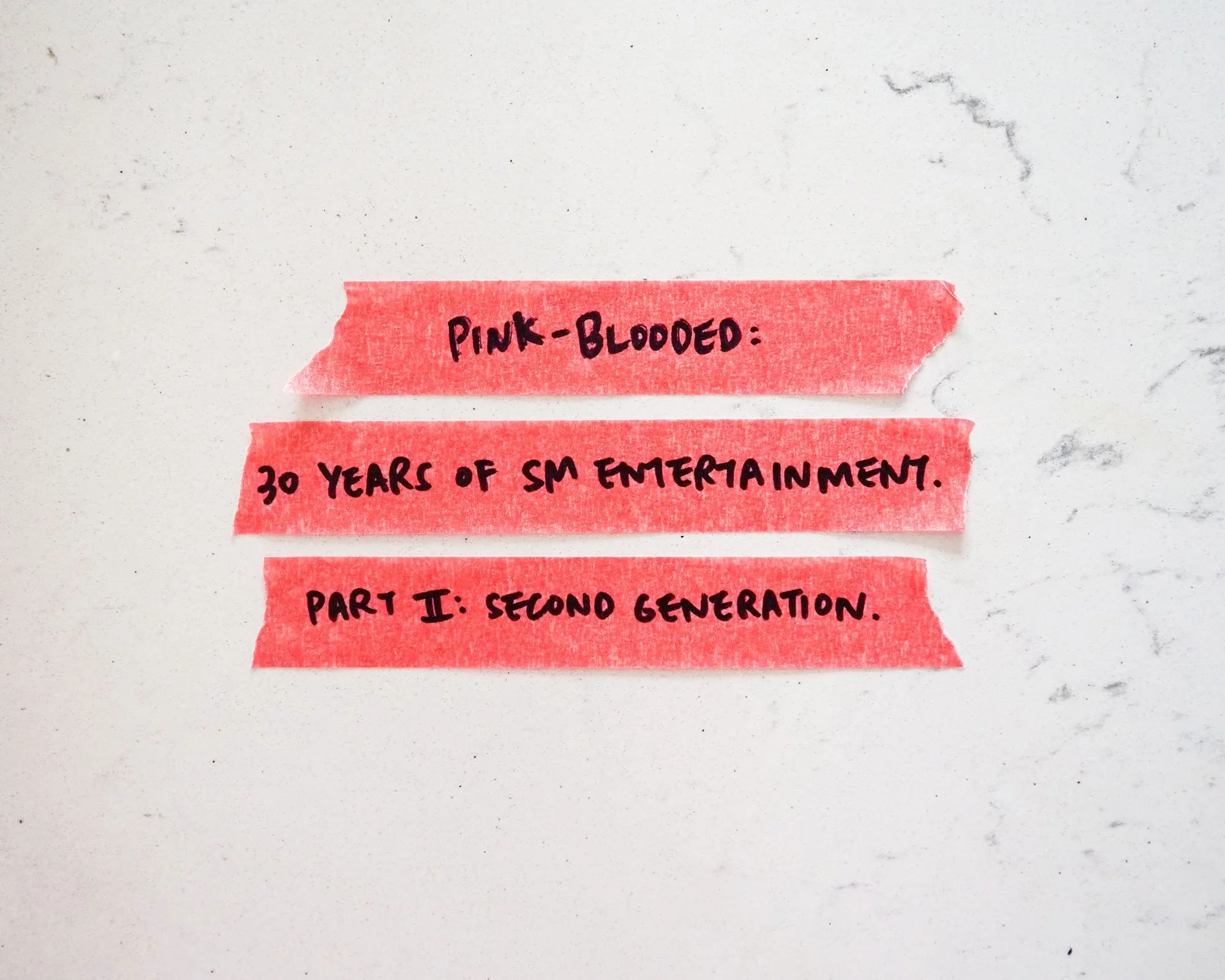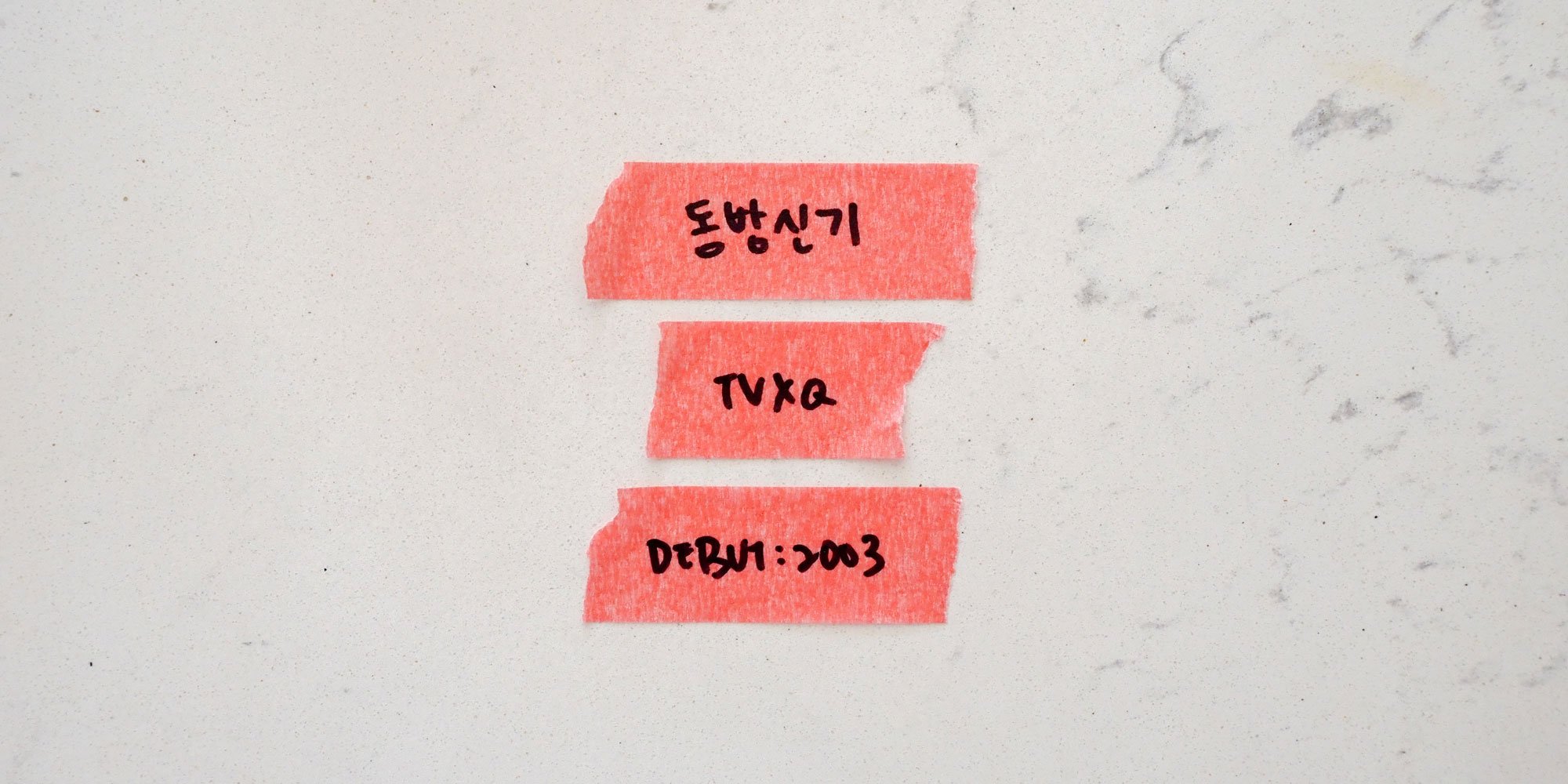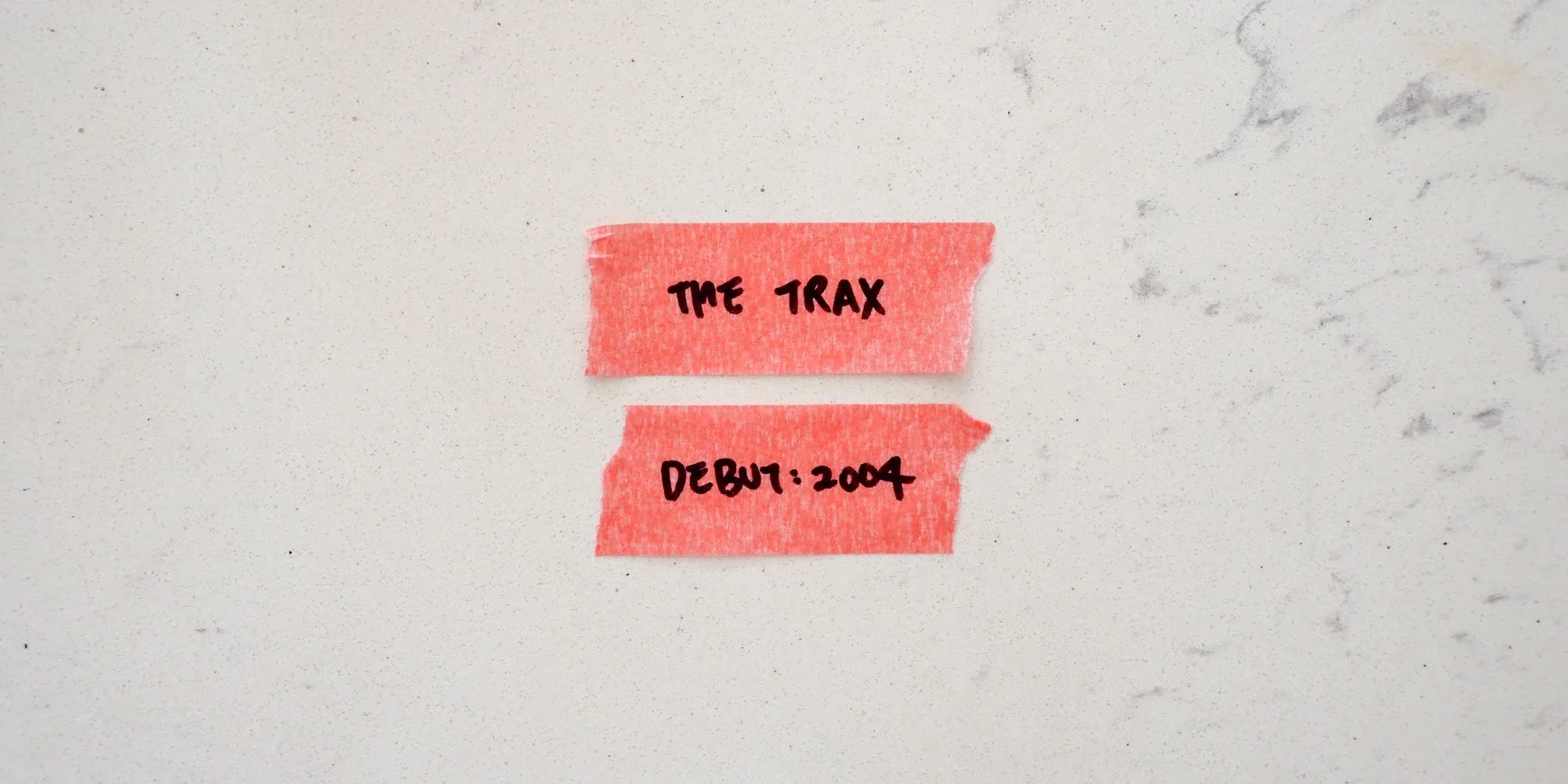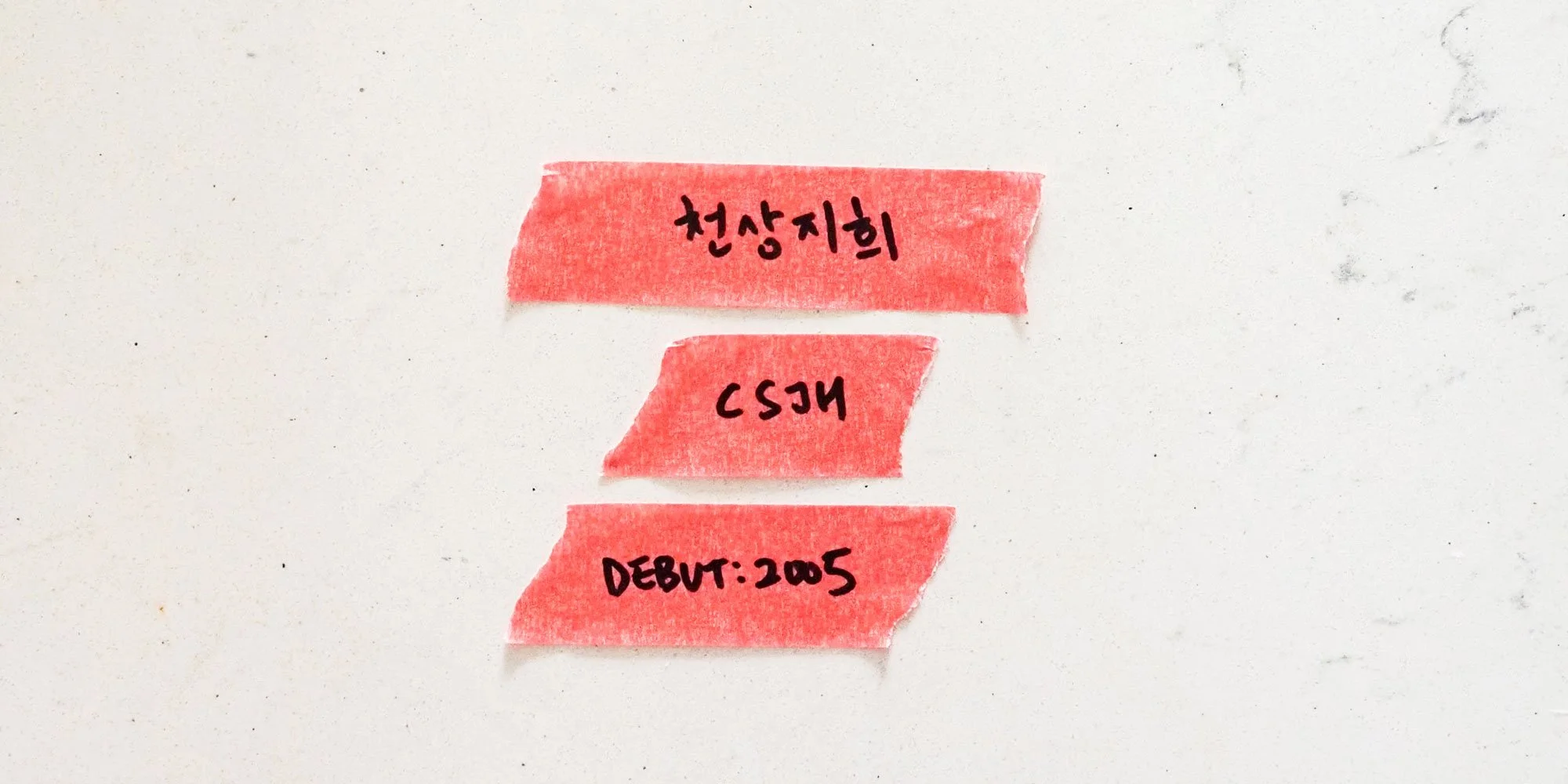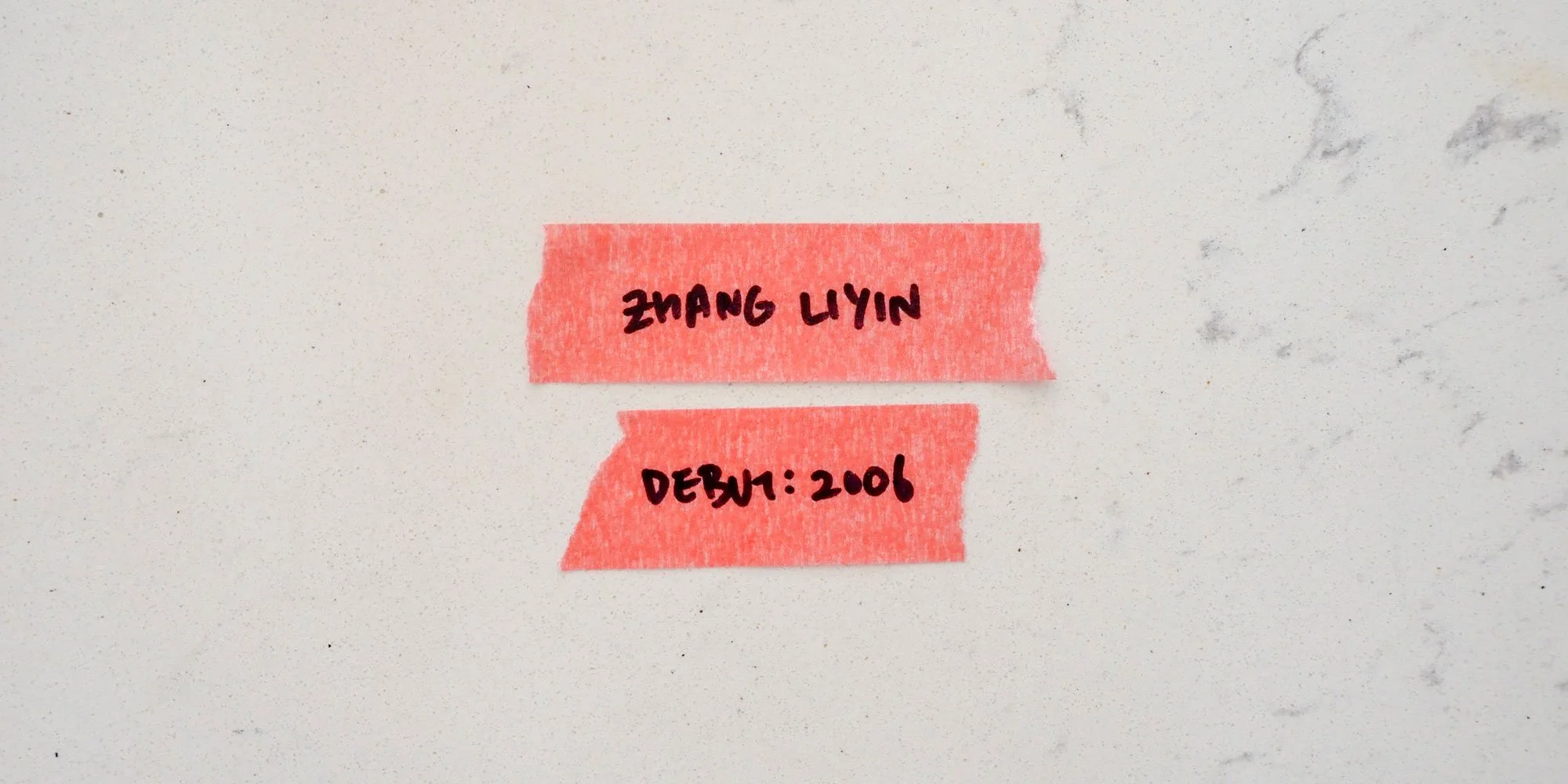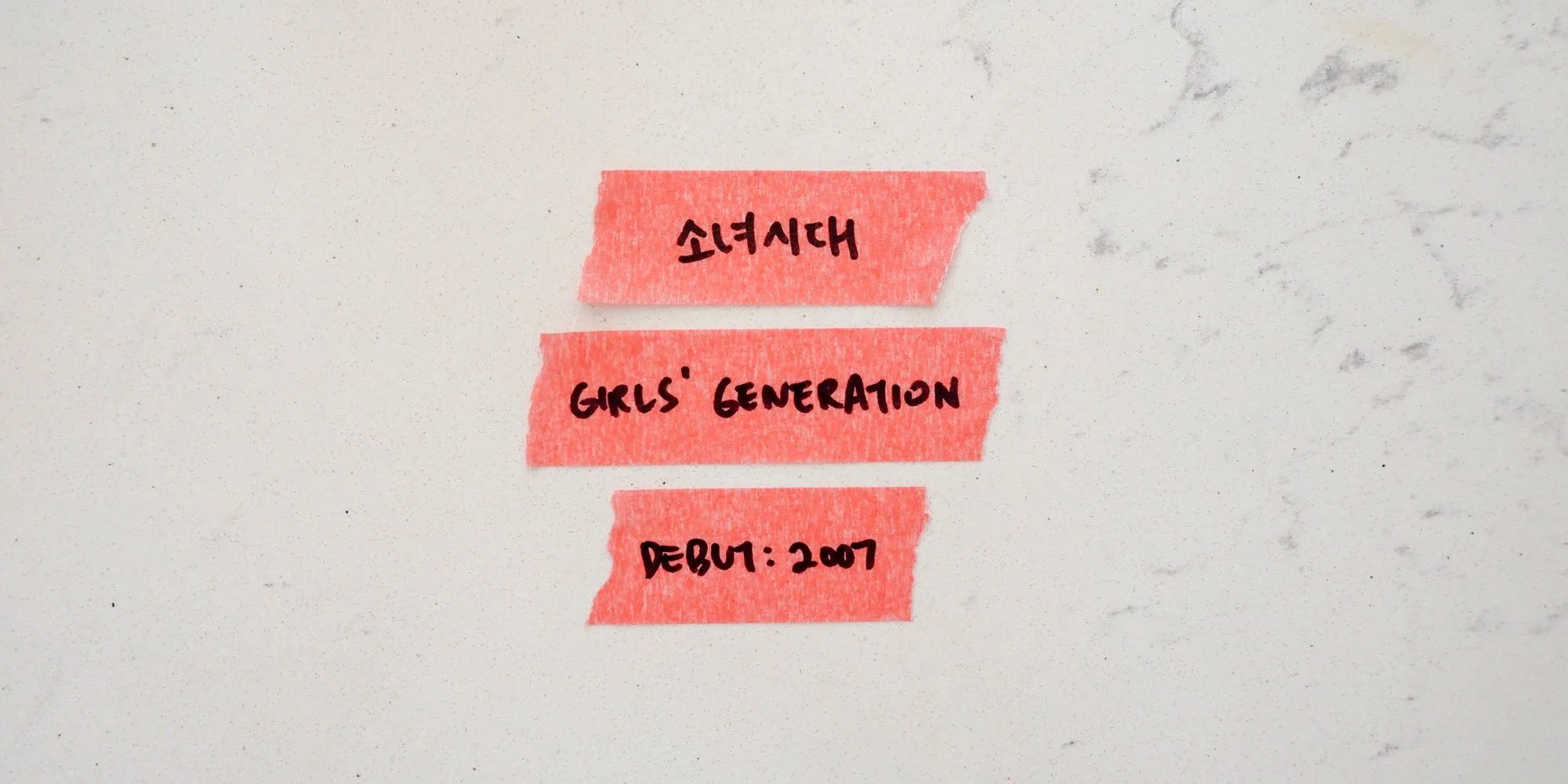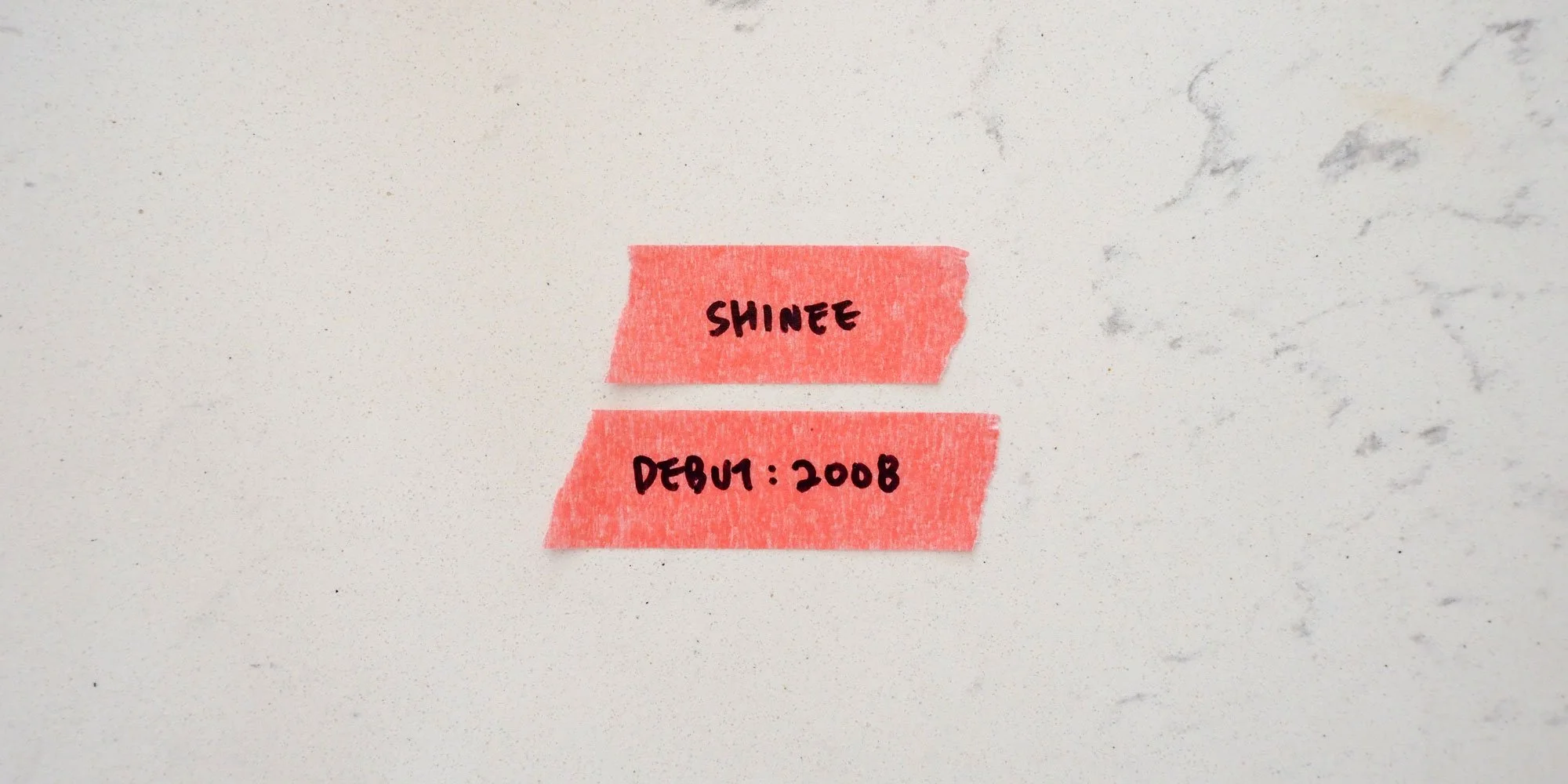pink-blooded: thirty years of SM entertainment.
part ii: second generation.
members: uknow yunho (leader), youngwoong jaejoong, micky yoochun, xia junsu, choikang changmin
fanclub name: cassiopeia
fan color: pearl red
fan lightstick: byeolbong (unofficial name)
호칭 (introduction): n/a
TVXQ (東方神起) debuted with the line, “for one day, i want to be the bed in your room,” and i. loved. them. after H.O.T., i’d gone through obsessions with shinhwa and fly to the sky, but it wasn’t until TVXQ that i returned to the full-forced intensity with which i loved H.O.T. my bias was jaejoong (he was just so pretty and hilarious and weird), and, as i say in my book (and have said on social media multiple times), i carry jaejoong with me — my online ID, jjoongie, is a play on his name.
TVXQ could sing. they were known for their vocals, harmonies, and acapella as much as they were for jaejoong’s visuals, and they were huge, one of the representative boy bands of second-generation k-pop alongside big bang. TVXQ is the group that really forced a spotlight on SM’s horrible, long, exploitative contracts, now colloquially termed “slave contracts,” when jaejoong, junsu, and yoochun sued the company in 2008. the lawsuit was messy and very contentious, and, ultimately, the case was settled in arbitration in 2012 with the three released from their contracts — then blacklisted from the industry for years and years. if you were a fan of SM, none of this was a surprise, from SM’s horrible terms to their treatment of their artists to the long contracts idols were caught in, but i dare say TVXQ’s suit was the first time the mainstream really paid attention. it’s because of them that the FTC, in 2009, passed regulations restricting contacts to seven years and that penalties for breaking contracts early were reduced.
(despite what new western k-pop fans love to say, the newjeans contract conflict is not similar to TVXQ’s, and, contrary to TVXQ’s lawsuit, the newjeans situation isn’t an example of a company wielding its power to lock an artist into an abusive contract.)
as much as fandom is about loving your favorite idol, there is the other side of idoldom: antifandom. i personally think that they’re two sides of the same coin; whether you’re professing love or hating, you’re still obsessed with someone who has retained your interest. then there’s the extreme side of fandom that is sasaeng fandom; sasaengs stalk their favorite idols, harass them, do them harm all in the name of love.
in 2006, yunho was poisoned by an antifan who handed him a bottle of juice that had been spiked with super glue and somehow re-sealed. in an enclosed letter, she wrote that she just didn’t like him and that he should watch his mouth, and, after the assailant was identified and caught, he forgave her and asked the police for leniency given her age. this is another side to korean celebrity that irritates me; celebrities are supposed to be more magnanimous, even when they suffer harm; and my U.S.-raised self does not understand this, given how petty koreans are. i know because i’m korean.
TVXQ, like pretty much all idols, have dealt with more than their fair share of sasaeng fans who can get dangerous — jaejoong said that he once woke up to a sasaeng fan who had broken into his apartment and was kissing him. it’s unsurprising that these extreme fans exist, and crazed stalkers are certainly not unique to the idol industry, just like parasocial relationships are not. i do think that one of the things that does make korean idol culture different, though, is the extent to which parasocial relationships are built into the industry — they’re not a by-product of celebrity and fame but encouraged by entertainment companies from the get-go, even pre-debut with well-known trainees (see: SM rookies) in order to build and maintain fan loyalty. some idols are more encouraging of these parasocial relationships (e.g. exo’s baekhyun) (honestly, though, i think bangtan’s jungkook is one of the worst offenders to his own detriment), and i think things like bubble, fan calls, and lives have made these parasocial relationships worse. i’m particularly not a fan of fan calls, especially because they’re specifically tied to hyper-consumerism and waste (you win fan calls by purchasing albums, so fans tend to buy tons of albums and toss them.)
idols sell a fantasy, though, and part of maintaining that fantasy is allowing a certain amount of access and maintaining the illusion that idols are somehow available to the public. for a long time, idols weren’t allowed cell phones and were banned from dating, and, though no dating ban might officially exist today, idols still deal with considerable public fall-out if they’re caught in a relationship. dispatch, korea’s resident tabloid, released photos of aespa’s karina dating actor lee jaewook in early 2024, and she had to release a handwritten letter apologizing.
(honestly, i thought karina and lee jaewook made for a cute, age-appropriate couple, and it sucks that they were never given an opportunity to get to know each other properly before they were exposed.)
jaejoong continues to be SM’s ideal male face, and, to be honest, i don’t think k-pop as a whole has had A Visual since second-gen k-pop that comes close to the impact that jaejoong and big bang’s T.O.P’s faces had and continue to have. NCT’s taeyong is practically a doppelganger for jaejoong, though, and i would pay good money to have them on a show together. riize’s wonbin sometimes gives me jaejoong vibes, depending on how he’s styled, even though he doesn’t necessarily physically resemble jaejoong. SM has been continuing to look for a new jaejoong ever since, well, jaejoong.
i haven’t listened to any of TVXQ’s new music after they split because my loyalty went with JYJ, even though i understood why yunho and changmin would stay with SM, and i didn’t fault them for it. TVXQ’s lawsuit marked the beginning of my brief emotional hiatus from k-pop — i was so burned out by then and was in a terrible place in my own life, so i had a little thing with big bang before their cultural appropriation pushed me away, and i only kept a toe in k-pop for a few years. i did check out some of jaejoong’s solos over the years, though, because i still love jaejoong. he’s such a 4D alien, and i’m happy to see him thriving despite SM having tried to block him for over a decade now.
(yoochun turned out to be a terrible human, so we ignore his existence now. he’d also been ruining his voice as a huge smoker, anyway.)
*TVXQ is often colloquialized by fans as DBSK.
recommended songs:
“hug” (tri-angle, 2004)
“마법의 성 (magic castle)” (the christmas gift from TVXQ, 2004)
“rising sun” (rising sun, 2005)
“どうして君を好きになってしまったんだろう?,” (どうして君を好きになってしまったんだろう?, 2008)
“mirotic” (mirotic, 2008)
members: jay (leader, vocalist), minwoo (drummer), jungwoo (bass guitarist), jungmo (guitarist/bass guitarist)
fanclub name: traxian
fan color: pearl cobalt blue
fan lightstick: n/a
호칭 (introduction): n/a
look, SM somehow got X japan’s yoshiki to produce the trax. i did not expect SM to make a rock band, but they did, and the trax debuted in 2004 with “scorpio” (written by yoshiki). they also covered X japan’s “tears” on the album. to be honest, the trax sounded too derivative of j-rock but without the soul for me to get really into them (and i was really into j-rock for a while), but i did enjoy them and thought it was cool for SM to branch out and try something different.
when you look at SM’s history up until this point, though, it’s not totally out of left field that they would venture into rock. a lot of H.O.T.’s later stuff had rock elements, moon heejun’s solo albums were rock, and, okay, fine, maybe those are the only early examples i can think about. (TVXQ’s jaejoong and super junior’s heechul both loved rock, though, and exo’s suho and chanyeol’s respective solo work is closer to rock — chanyeol, apparently, wanted to be in a band before he joined SM and became part of exo. NCT 127’s yuta’s solo work is co-produced by avex trax and is properly in the j-rock genre.) SM has continued to play with other genres and forms of music, just not under their main SM umbrella but in subs, like SM classics, which do orchestral arrangements of SM songs in collaboration with the seoul philharmonic or with SM’s in-house orchestra, and they just released a jazz single under the same sub. SM also apparently has subs that do more house-ish music? i actually don’t know the full extent of all the stuff SM does.
this willingness to experiment is something i continue to love about SM. for a few years, they released fun collabs and special tracks under SM station, even bringing in artists from outside the company, but they seem to have dropped this project, which makes me sad. i do wish SM would pick it up again — and release the orchestral arrangement of H.O.T.’s “빛 (hope)” already! we know it exists! they performed it during their concerts last year!
anyway, i wonder if, given more time, better songs, and more opportunities to write their own music and develop their own sound instead of being such a clear j-rock derivative, the trax could have been a legit rock band. SM gave them a decent run, though, longer than i actually thought they would — the trax continued as a band until 2012 then returned in 2014 as a EDM trio (?) before disbanding in 2019.
recommended songs:
“over the rainbow” (scorpio, 2004)
“scorpio” (scorpio, 2004)
members: lina, dana, sunday, stephanie
fanclub name: shapley
fan color: pearl pink
fan lightstick: n/a
호칭 (introduction): n/a
CSJH (天上智喜) the grace, as the group is colloquially acronymized, was made up of four members, including dana (the former soloist) and jiyeon (of isak n jiyeon). they were styled to be the female version of TVXQ, with a heavy focus on vocals, and CSJH was an outlier to the SM voice — the girls’ voices were throatier and bigger, and they seemed more “adult,” not in the sense that they were sensualized or sexualized but in that they were presented as having a more mature sound and image, which would contrast with the girlish sweetness imbued by SNSD two years later.
i didn’t follow CSJH because they weren’t my personal taste, both vocal-wise and music-wise, which, again, is entirely subjective. i liked that they existed, though, a female counterpart to TVXQ with their vocals, which made them stand out in the general k-pop idol landscape. i have, over the years, often asked myself if my preference for boy bands and male voices is a form of internalized misogyny because i find that i tend to have more mental hurdles to overcome when it comes to female idols and groups — like, it actually took me a while to admit that i loved boa, and, while i instantly loved TVXQ when they debuted, it took me years to get into SNSD and red velvet. even today, i much prefer male voices over female. maybe some things just come down to personal preference, and that’s fine, but i don’t think it’s a bad thing to pause every so often and take stock of your preferences because taste doesn’t come out of nowhere — we are influenced constantly by the patriarchal, heteronormative, and, for many of us, white world we live in, and the only way to dismantle internalized misogyny and/or racism is by constantly checking in with ourselves and interrogating what we accept as “normal.”
three members of CSJH recently appeared on jaejoong’s youtube talk show, jaechingoo!
recommended songs: n/a
members: leeteuk (leader), heechul, yesung, shindong, eunhyuk, sungmin, siwon, donghae, ryeowook, kyuhyun
former members: kangin, henry, hangeng, kibum
fanclub name: E.L.F. (ever lasting friends)
fan color: pearl sapphire blue
fan lightstick: superbong (unofficial name)
호칭 (introduction): 안녕하세요 슈퍼쥬니어예요!
every year, i go through a phase when i have to listen to “sorry sorry” on repeat. super junior (or suju) debuted as a twelve-member group, and SM initially wanted to rotate out members (there was a rumor that SM was going to rotate members of TVXQ, but the fandom revolted). SM gave up the rotating idea fairly quickly when khuhyun, the thirteenth member, was added in 2006.
i didn’t listen to a lot of super junior and never really got into them because there were too many members, and, while they had a few incredible vocalists, like kyuhyun and yesung, i thought they weren’t as well-rounded as TVXQ. that wasn’t a fair comparison because they’re different groups, but i did love the camaraderie between the groups because many of the members trained together, and i loved heechul. i don’t know why i put that in past tense because i still love heechul. he is one of my favorite people in korean media, and i love him for his bluntness, his humor, and his general thoughtful persona. in 2006, after leaving donghae’s father’s memorial service, heechul got into an accident so bad that he is now considered disabled because of the steel rods holding his femur together.
one of my personal things is that i don’t take that kindly to insults against leeteuk. he’s not perfect (no one is), but leeteuk has been through a lot and does a lot for the group as the leader. i guess i haven’t really talked about what it means to be designated the “leader” of a k-pop group; that could be its own essay because it’s a weird role in k-pop (the notion of putting so much emotional responsibility on someone so young is frankly kind of odd); but it can be a pretty important position. it isn’t always the eldest member of a group who gets the designation, and it can be a burden to carry. when i think of leaders of groups who have really taken on their role and done a lot for their members, i think about leeteuk and exo’s suho.
suju celebrated their twentieth anniversary in 2025, which is cool. they’re now nine members, though, and choi siwon, reputed for being very conservative and religious and from a wealthy family, is unfortunately still present. suju is a weird group for me — i’m sentimental over them, given their longevity, but there’s been a lot of controversy around different members. i don’t know that i agree with the mentality that choi siwon should be removed from the group just because he’s conservative and has terrible political views because that does feel like censorship, but i also do understand that platforming his rhetoric is harmful and dangerous. he hasn’t committed a crime, though, and he is entitled to believe what he wants to believe, so i don’t think SM has any legal grounds to remove him — but i am glad to see that several of suju’s remaining members seem to treat him professionally but distance themselves personally.
recommended songs:
“sorry, sorry” (sorry, sorry, 2009)
“로꾸거!!! (rokkugo)” (로꾸거!!!, 2007)
fanclub name: n/a
fan color: n/a
fan lightstick: n/a
호칭 (introduction): n/a
SM has never prioritized the western market; lee sooman was always about china — he wanted to debut H.O.T. in china and did, and exo was one group broken into two units, one korean, the other mandarin. the problem is that SM has never been great about retaining their chinese talent — they treated hangeng from suju like shit, three chinese members from exo left and sued SM within two years of the group debuting, and SM still sidelines its foreign talent, from wavy’s winwin to aespa’s ningning. i get particularly annoyed over SM’s treatment of ningning because the girl is ridiculously gorgeous and the strongest vocalist of the group. i don’t care for brand ambassadorships, but it’s suspicious that ningning had yet to go to a versace show before that partnership quietly ended while karina has been to several prada shows (where the brand seem to forget she’s a young woman in her early twenties and insists on dressing her like a fifty-something-year-old matron).
at this point, i feel like i should make a sign saying that SM has never prioritized the western market because western fans get really twisted up over how SM’s western promotion sucks and i’m tired of repeating myself. there’s a lot of quiet racism in western k-pop fandoms, and it leaks out in various ways, one of which is this continued putting of the U.S. music market on a pedestal, like it should be the market to aspire to, like success in the U.S. is some marker of superior talent and value. i don’t think it is at all; the korean idol industry and the U.S. pop industry come from different cultures with different values; and it’s frankly imperialistic to hold up the american standard as intrinsically better.
besides, again, SM has always been about china. lee sooman is still trying to get that market with his new company A20, though i guess we’ll see what happens when he’s allowed back into korea (for business) in 2026. and, again, no one is saying that SM is necessarily smart about its approach to china — if they were, they would be getting all nine members of exo together for their december 2025 comeback, given that china is supposedly-potentially-maybe-we’ll-see going to reopen to k-pop.
zhang debuted as a soloist in korea, and she did a duet with junsu of TVXQ. i really liked zhang’s voice; it’s full and throaty but also warm and light; and she had excellent technique. i didn’t really follow her after her debut, though — she debuted in china in 2008 and was part of the SM the ballad unit, but she left SM in 2017.
recommended songs:
“timeless” (timeless, 2006)
“y (why)” (timeless, 2006)
members: taeyeon (leader), sunny, tiffany, hyoyeon, yuri, sooyoung, yoona, seohyun
former member: jessica
fanclub name: sone (소원)
fan color: pastel rose pink
fan lightstick: 어금니봉 (unofficial name)
호칭 (introduction): 오늘은 소녀시대!
SNSD* was the girl group of second-generation k-pop, known as the nation’s girl group. “다시 만난 세계 (into the new world)” is the unofficial national anthem of korea, sung by students who protested parachute admission at ewha, by attendees at pride parades, by protesters calling for yoon’s impeachment in late 2024 to early 2025. the group has also sonically influenced k-pop as a whole — their 2013 comeback title track, “i got a boy,” was so polarizing because it sounded like three songs mashed into one with abrupt drop transitions, but, soon, everyone was mimicking it.
(honestly, we have to give it to yoo youngjin; he also gave us NCT 127’s “sticker.”)
SNSD marks a committed return to SM’s preferred vocal tone when it comes to female vocals. isak n jiyeon, zhang liyin, CSJH sounded like experiments, a venturing into female vocals with richer, fuller sounds, instead of the thinner tones that SM had started with (e.g. S.E.S.). SNSD’s sound was thinner and sweeter, a trend that has continued on through today (i’m not surprised that ejae never debuted in a SM girl group; i’m surprised SM kept her in trainee limbo for so long because her voice doesn’t fit the company’s preferred color or tone), but, like i said earlier, one thing i think SM does particularly well is that they are able to put together groups that sound really pretty together — and i think they really figured that out with SNSD.
(SNSD’s forever 1 [2022] is a great example of this — tracks like “forever 1,” “lucky,” and “seventeen” really showcase how pretty the members sound together.)
i did not like SNSD when they debuted. i thought jessica and tiffany looked like foxes, and i was so annoyed by how they showcased their long legs and leaned into aegyo, and, yes, a lot of my hate was driven by jealousy because SNSD came from SM, which means they got to interact with TVXQ. i also hated “gee” when that song came out in 2010 and went viral, though i probably didn’t hate it as much as taeyeon famously did (it actually became a running joke that, if taeyeon hated a SNSD title song, it would become a hit).
i didn’t really start listening to SNSD until “i got a boy,” which i disliked upon first listen but kept coming back to because i loved the organized chaos. (honestly, i should probably also write an essay about SM’s two big-name producers — yoo youngjin and kenzie. if i could interview one person in k-pop, it would be kenzie. long live kenzie.) i still haven’t listened to a whole lot of SNSD because their music did tend to be too sweet and girly for me, but i have come around to really loving the members. it’s especially been cool to see them in recent years, as they’re now all women in their thirties who have shed the self-consciousness of being young female idols, finally released from the saccharine-sweet aegyo and girlishness they were trapped in for far too long into their twenties and now allowed to be who they are — funny, spunky, driven women who have weathered a lot of shit and left an indelible mark on this industry.
*SNSD is a common colloquial acronym for the group. they’re also often called soshi by fans.
recommended songs:
“다시 만난 세계 (into the new world)” (girls’ generation, 2007)
“i got a boy” (i got a boy, 2013)
“everyday love” (love & peace, 2013)
“all night” (holiday night, 2017)
“girls (korean version)” (catch me if you can, 2015)
members: onew (leader), jonghyun, key, minho, taemin
fanclub name: shinee world (aka shawol)
fan color: pearl aqua
fan lightstick: shating star
호칭 (introduction): 빛나는 샤이니 입니다!
i remember when shinee debuted with “누나 너무 예뻐 (noona, you’re so pretty)” because i thought it was hilarious and on the nose — i can’t quantify this or back this up with evidence, but i feel like shinee debuted around the time there was an upward trend of “noona fans” — or, at least, when it started to become more acceptable and maybe more cool to be a noona fan. that would make sense, though, as shinee was now firmly in second generation territory, so there was now an entire generation of fans who were older, so, of course, that generation of fandom would be stanning younger idols.
i didn’t listen to much shinee; their sound is brasher and louder than TVXQ’s smoother pop; and i still am not super familiar with their discography.
even though i wasn’t a huge shinee fan, jonghyun’s death hit me hard. i’d known that he lived with depression, and, as someone who has also lived with suicidal depression since adolescence, i’d found his solo work soothing and comforting. i don’t think i’ll ever forget how i felt waking up that morning, checking my phone, and seeing his name trending on twitter. it’s never good to see a yeonaein’s name trending on twitter, and i didn’t have to look up the news to know what had happened.
jonghyun truly was a special human and a rare idol in k-pop. he posted about bombings in gaza long before the world was really paying attention to the intentional erasure of palestinians that’s really been going on for decades, and he would engage with netizens when called out on issues, trying to learn and do better. i don’t particularly care about people’s opinions, but i do not take kindly to people who diss shinee or f(x). these two groups break my heart and make me rage. i also get really defensive about this generation of SM kids because they carry so much grief and loss.
recommended songs:
“sherlock (clue + note)” (sherlock, 2012)
“dream girl” (the misconceptions of us, 2013)
members: victoria (leader), amber, luna, krystal
former member: sulli
fanclub name: MeU
fan color: pearl light periwinkle
fan lightstick: n/a
호칭 (introduction): n/a
f(x) is an example of what i find so fun about SM: SM variegates its groups well. each group has its own identity and sound, but all the groups still exist within the sonic universe that is SM.
(this is a tangent, but i think the rut YG has gotten stuck in and still has not been able to emerge from is an inability to diversify their sound — they’re still very stuck in big bang and 2NE1, though this was not always the case! early YG was a lot of fun between jinusean, 1TYM, and se7en. the company has never been great for women, even though YG did debut women, but, idk, yang hyunsuk sabotaged one of his own girl groups, swi.T, bc he wanted to date and marry one of the members, whom he had first met when she was in middle school before joining YG when she turned sixteen. i also get really angry when i think about how YG treated 2NE1 and ruined park bom.)
f(x) was five girls when they debuted, and they had an electropop sound that made them stand out in the idol landscape. their music was generally critically well-received, and their art direction, under min hee-jin (who was and still is a controversial person otherwise), was excellent. f(x) always felt a little niche to me, though, like as niche as any group from SM can be, and i think they definitely get more wide recognition today than they did when they were active. the group hasn’t officially disbanded, though all the members are no longer with SM, and the last single they released was in 2016. it’s also ridiculous if you think about the fact they didn’t get an official fandom name until 2016.
i will say that i was very impressed that SM didn’t force a feminine, cute concept on amber but styled her in the more masculine way that seems to be true to her. it might seem like a small, inconsequential thing, but korean society is rigidly gendered (in ways that outwardly may be different from gendered expressions in the west), and i remember being shocked when i first saw amber styled more boyishly in contrast to the other members — and when SM continued to do so. (the same goes for how SM also let taemin play with gender expression.)
on august 7, 2015, member sulli formally left the group. sulli had been in entertainment since she was a child, and, in her final years, she became the target of vicious cyber bullying. she was dating choiza, a rapper from dynamic duo fourteen years her senior (their whole relationship was suspicious because they met when sulli was fifteen, and they publicly said they were dating when she was twenty and he was thirty-four, and the whole thing is just really disgusting on his end), and she wouldn’t really conform to korean expectations, talking about how she sometimes went braless, taking on controversial acting roles that featured drug use, and generally being perceived as being weird and unconventional. she spoke publicly about dealing with hateful comments and cyberbullying, reportedly even asking SM shortly before her death to do something about them.
on october 13, 2019, she died by suicide.
i hold jonghyun and sulli’s deaths against SM, not necessarily because i think SM could have prevented them per se but because i do think SM is partially responsible for them. the idol industry is built off exploiting the talents, lives, and bodies of young people, who are placed in very vulnerable positions, whether as contractors within their companies, as public figures held to the court of public opinion in an industry built on parasocial relationships, as young people under the control of adults who see them as products. i don’t know what SM could logically have done to fend off malicious comments, libel laws being what they are, and, sure, it sounds good for companies to release statements regularly saying that they’ll pursue legal action against malicious, hateful comments — but what that actually results in is a separate question. whether or not the public is entitled to transparency is another question, not when the public is equally at fault in much of the negative treatment yeonaein, especially female yeonaein, are subject to.
i absolutely believe that SM needs to do better by their artists because i never want to wake up to another idol’s name trending on social media, but i can’t state what tangible actions that would or should look like. i do also think the social responsibility for jonghyun and sulli’s deaths also partially fall on the public at-large — sulli, in particular, dealt with some truly horrific, malicious comments thrown at her — and i think the government needs to do its part by passing legislation that actually provides a legal means for artists to pursue litigation and prosecutors to charge netizens so they face consequences. (i have some potentially controversial views on what i think should be the limits of free speech; sure, you can say whatever you want, but that doesn’t mean you should not have to face the consequences for saying whatever you want, especially when your word vomit causes real-life harm.)
in the end, protecting idols has to be a holistic, societal effort, and i think SM could at least start by maybe disengaging from the intense parasocial relationships k-pop has been built on. the company could do a better job at balancing the idea of an idol as a product but also, first and foremost, as a human being, and the company could certainly benefit from realizing and acknowledging that idoldom is a two-way street — sure, the idol might not exist without the company, but the company most certainly would not exist without the idol. there still seems to be a prevalent idea that an idol is replaceable, that there is a line of young kids who are willing to take abuse for a shot at stardom, but i think even the history of SM proves that, no, stars are not a dime a dozen, that finding and nurturing talent is worthwhile, and that longevity is possible.
in the end, i think that, if you’re taking young people under your wing and expecting them to make tremendous sacrifices for a shot at standing on a stage, you should carry that responsibility with weight. it should bear on the executives and decision-makers at SM that these young people are investing so much into this industry, and i wish those in positions of power would take this seriously. i hope there’s someone at SM to speak up for these kids, protect their best interests, and try to put them in the best position for them to be healthy and to have long, sustainable careers — and, fine, if we need to be cynical about this, honestly, it’s in the company’s best financial interest to protect their talent.
recommended songs:
“첫 사랑니 (rum pum pum pum)” (pink tape, 2013)
“toy” (pink tape, 2013)
“red light” (red light, 2014)
“종이 심장 (paper heart)” (red light, 2014)
“4 walls” (4 walls, 2015)
